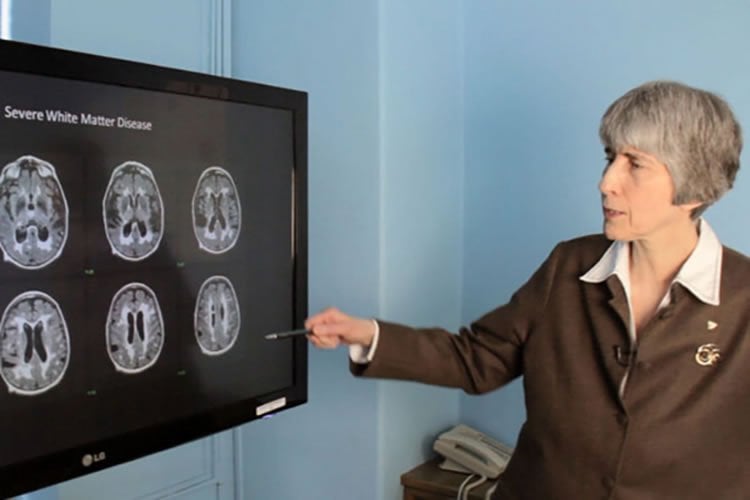Summary: Researchers use focused ultrasound to safely and non-invasively open the blood-brain barrier in Alzheimer’s patients.
Source: University of Ontario.
In the first peer-reviewed published report of its kind, University of Toronto researchers have demonstrated that focused ultrasound can be used to safely open the blood-brain barrier (BBB) in patients with Alzheimer’s disease.
The study, “Blood-brain barrier opening in Alzheimer’s disease using MR-guided focused ultrasound,” was published recently in Nature Communications.
“This is a critical first step,” says lead author Nir Lipsman, an assistant professor in the department of surgery and director of the Harquail Centre for Neuromodulation at Sunnybrook Health Sciences Centre.
“By successfully, safely and reversibly opening the blood-brain barrier in patients with early-to-moderate Alzheimer’s disease, we can support the continued investigation of focused ultrasound as a potential novel treatment, and further study the delivery of therapies that otherwise cannot access the brain.”
The BBB surrounds the small blood vessels of the brain to protect it from toxins and infectious agents. It also prevents drug therapies from entering, which could be effective in treating disease. In this Phase 1 trial, the focused ultrasound technology used low frequency ultrasound waves to non-invasively open the BBB in a small area of the frontal lobe in patients with mild-stage Alzheimer’s disease. No drug therapies were administered as the trial investigated safety and feasibility.
“We are pioneering exciting potential innovative treatment options for patients,” says Professor Sandra Black
“While it is still early in development, in the future focused ultrasound may provide a non-invasive, effective way of delivering large molecules such as antibodies or even stem cells directly to the brain to help patients with Alzheimer’s,” says Professor Sandra Black, co-principal investigator and internationally renowned professor of neurology at U of T and Sunnybrook. “We are pioneering exciting potential innovative treatment options for patients.”

In 2015, Sunnybrook researchers safely opened the BBB to test the delivery of chemotherapy directly to a patient’s brain tumour. This recent study is the first peer-reviewed, published report showing the safety and feasibility of breaching the BBB in patients with Alzheimer’s.
Kullervo Hynynen, a professor of medical biophysics and director of physical sciences at Sunnybrook Research Institute, worked with INSIGHTEC, a global medical technology innovator of incisionless surgery, for almost two decades to develop the technology.
Alzheimer’s is the most common neurodegenerative disorder, which over time robs people of memory and thinking ability. Over 6.4 million people in North America and at least 44 million people worldwide are living with Alzheimer’s or another dementia.
Phase two of the study will begin this fall.
Source: University of Ontario
Publisher: Organized by NeuroscienceNews.com.
Image Source: NeuroscienceNews.com image is adapted from the University of Ontario news release.
Original Research: Open access research for “Blood–brain barrier opening in Alzheimer’s disease using MR-guided focused ultrasound” by Nir Lipsman, Ying Meng, Allison J. Bethune, Yuexi Huang, Benjamin Lam, Mario Masellis, Nathan Herrmann, Chinthaka Heyn, Isabelle Aubert, Alexandre Boutet, Gwenn S. Smith, Kullervo Hynynen & Sandra E. Black in Nature Communications. Published July 25 2018.
doi:10.1126/sciadv.aar8590
[cbtabs][cbtab title=”MLA”]University of Ontario”A Safe and Non-Invasive Way to Open the Blood-Brain Barrier in Alzheimer’s Patients.” NeuroscienceNews. NeuroscienceNews, 26 August 2018.
<https://neurosciencenews.com/bbb-alzheimers-9744/>.[/cbtab][cbtab title=”APA”]University of Ontario(2018, August 26). A Safe and Non-Invasive Way to Open the Blood-Brain Barrier in Alzheimer’s Patients. NeuroscienceNews. Retrieved August 26, 2018 from https://neurosciencenews.com/bbb-alzheimers-9744/[/cbtab][cbtab title=”Chicago”]University of Ontario”A Safe and Non-Invasive Way to Open the Blood-Brain Barrier in Alzheimer’s Patients.” https://neurosciencenews.com/bbb-alzheimers-9744/ (accessed August 26, 2018).[/cbtab][/cbtabs]
Abstract
Blood–brain barrier opening in Alzheimer’s disease using MR-guided focused ultrasound
Magnetic resonance-guided focused ultrasound in combination with intravenously injected microbubbles has been shown to transiently open the blood–brain barrier, and reduce beta-amyloid and tau pathology in animal models of Alzheimer’s disease. Here, we used focused ultrasound to open the blood–brain barrier in five patients with early to moderate Alzheimer’s disease in a phase I safety trial. In all patients, the blood–brain barrier within the target volume was safely, reversibly, and repeatedly opened. Opening the blood–brain barrier did not result in serious clinical or radiographic adverse events, as well as no clinically significant worsening on cognitive scores at three months compared to baseline. Beta-amyloid levels were measured before treatment using [18F]-florbetaben PET to confirm amyloid deposition at the target site. Exploratory analysis suggested no group-wise changes in amyloid post-sonication. The results of this safety and feasibility study support the continued investigation of focused ultrasound as a potential novel treatment and delivery strategy for patients with Alzheimer’s disease.






